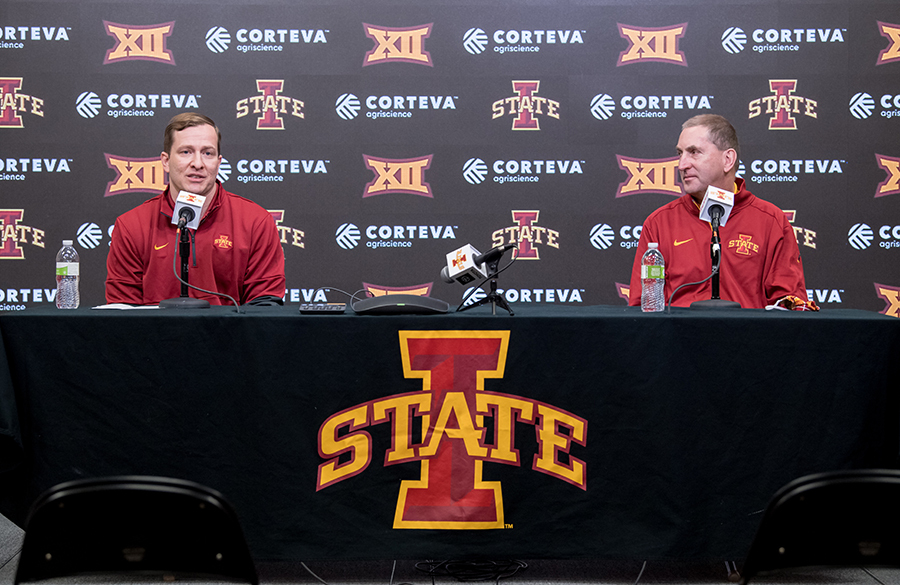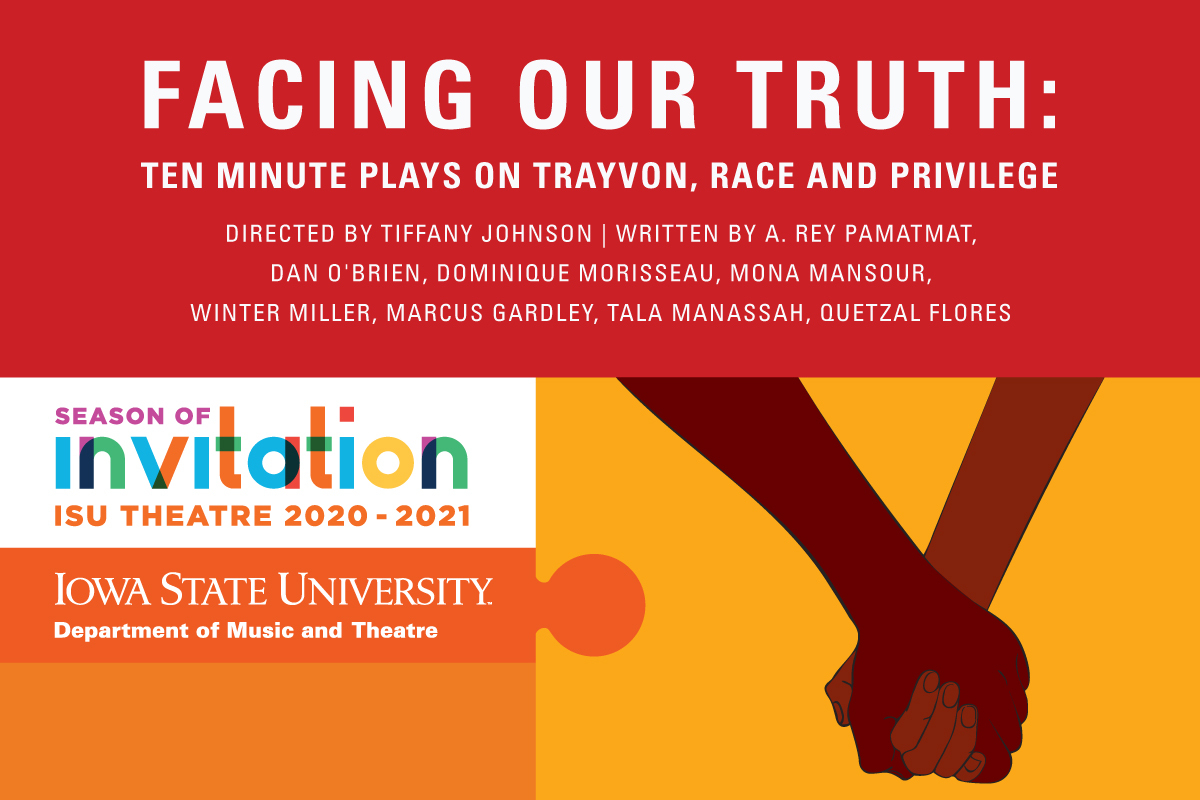More green space is coming to Pammel Drive

An excavator operator tackles the north side of the Genetics Laboratory. Visible in the background are the Advanced Machinery Systems Lab and the top of the Advanced Teaching and Research Building. Photo by Christopher Gannon.
Following an abatement phase, demolition commenced last week on the Genetics Laboratory complex, two buildings on the north side of Pammel Drive dating to 1933. Demolition of the roughly 17,000 square feet clears $1.34 million off Iowa State's deferred maintenance roster. Former occupants, from the entomology and natural resources ecology and management departments, relocated to Science II last fall.
Similar to the Insectary demolition last spring, this project includes disconnecting utility lines and removing a tunnel to the building under Pammel Drive, which will require closing the road for several weeks in late May. Also similar to the Insectary removal, the Genetics Lab site will be seeded with a diverse seed mix to establish a pollinator garden and habitat for migrating butterflies. Work is scheduled to wrap up by late June.

Photo by Christopher Gannon.
Mid-semester breaks, optional winter session return in 2021-22 calendar
Plans for a near-normal 2021-22 academic year took a step forward this week with the release of a calendar that features two 16-week semesters and an optional four-week winter session. It also includes weeklong fall and spring breaks.
Fall semester will begin Monday, Aug. 23, and spring semester will begin Tuesday, Jan. 18, 2022, following the Martin Luther King Jr. holiday.
"We are moving forward to having in-person classes and activities at pre-pandemic levels this fall," wrote president Wendy Wintersteen and senior vice presidents Jonathan Wickert (academic affairs) and Toyia Younger (student affairs) in a March 24 memo to all employees and students. "Online and hybrid classes will continue to be available for many courses, as they were before the pandemic, to meet students’ scheduling needs and preferred learning styles, but we will return to in-person instruction as the default for our beautiful residential campus."
They noted that planning will continue to hinge on the wide availability of vaccines and a commitment to safe health practices.
2021-22 academic calendar
|
Session |
Starts |
Ends |
|
Summer 2021 |
Monday, May 17 |
Friday, Aug. 6 |
|
Fall 2021 |
Monday, Aug. 23 |
Friday, Dec. 17 (Exams Dec. 13-16) |
|
-Thanksgiving break |
Monday, Nov. 22 |
Friday, Nov. 26 |
|
(Optional) Winter 2021 |
Monday, Dec. 20 |
Friday, Jan. 14 |
|
Spring 2022 |
Tuesday, Jan. 18 |
Friday, May 13 (Exams May 9-12) |
|
-Spring break |
Monday, March 14 |
Friday, March 18 |
|
Summer 2022 |
Monday, May 16 |
Friday, Aug. 5 |
Iowa State piloted a 25-day winter session this year and will offer a four-week option next winter for students who want to catch up or work ahead to meet their graduation requirements. The state Board of Regents has encouraged the three regent universities to offer students a condensed winter option. Three university holidays fall during the optional winter session: Friday, Dec. 24; Monday, Dec. 27 and Friday, Dec. 31. Details about winter session 2021 will be shared on a session website as they become available.
New effort supports fostered and homeless students
A universitywide program launching this fall will focus on supporting students who aged out of foster care, are homeless or whose families are unable to provide emotional support. It will tap existing student support services on campus and provide a community structure for its undergraduate and graduate members. It also will appeal to staff and faculty benevolence.
Students on the Rise in Education (or STORIES for short) is the brainchild of student services specialist Laura Kilbride in the College of Human Sciences. It combines her work and a personal commitment to advocating for disadvantaged youth. Five years ago she trained to become a court-appointed special advocate (or CASA) for children in Story County and subsequently a licensed foster parent, primarily for teen girls. She also was working on a master's degree in student affairs. Many of her course projects focused on foster teens, but she noticed that population wasn't part of most discussions.
"The chance of a high school student in foster care going to college is so slim. Nationally, 3% of foster youth get a four-year degree," she said. "They move frequently and lose high school credits when the next school doesn't have the class they were in at the previous school. Navigating college applications, paying the fees, filling out the FAFSA (Free Application for Federal Student Aid)? It's next to impossible for them."
How it works
Students who want to participate in STORIES fill out an interest form on the program website, and Kilbride confirms their eligibility. She said it's difficult to know how many students the program could serve. The FAFSA application asks about foster care participation at age 13 or later, but she knows not all eligible students complete a FAFSA or, if they do, might ignore that question on a federal form. Employees in similar programs in other states told her their participation numbers jumped, though, when they posed the question on the school's application form. Kilbride is investigating that possibility for Iowa State's 2022-23 class recruiting cycle.
The program's mainstay will be two workshops each month that gather participants for social networking, a meal and a presentation on a campus service available to them. Participants will receive help linking to the services they need to succeed at Iowa State and mentoring on a level they choose, Kilbride said.
Opportunities for faculty and staff who want to be involved include:
- One-on-one mentoring with a student
- Meal donation for a workshop
- Other specific donations, for example, care packages or anonymous small gifts for the winter holidays
Faculty and staff can express interest in either of the first two in this Qualtrics form. This spring, a critical role they can play is to refer eligible students to the program website so they can apply and be accepted by fall when it rolls out.
"This is going to be a highly collaborative process across the university," Kilbride said. "We're not providing the services ourselves, we're providing that link, a fast track to the services they need from the many that exist."
First in the state
Kilbride said she spent a few years researching university programs for students who'd been in foster care and found some strong ones -- but none in Iowa. So she advocated for one in her college.
"We're the land-grant. We're about open access," she noted.
Her supervisor, Clayton Johnson, took her proposal to associate dean Robert Reason and dean Laura Jolly, who approved the plan in January.
"This is a really innovative program for the state of Iowa, the first of its kind, so it's exciting we can step out and be the leader on this," Kilbride said. "My hope is that we'll continue to see programs like this across the country."
Kilbride is recruiting a core team of 15-20 university employees "who are passionate about helping this student population and ready to advocate and make amazing things happen for them."
It includes a member from the TRIO student support services program, a federal grant-funded program that serves first-generation or low-income undergraduates or those with a disability. Kilbride said there could be some overlap between the two programs, so they'll cooperate to avoid duplication.
STORIES core team members:
- Coordinator Laura Kilbride, College of Human Sciences student services specialist
- Audrey Kennis, College of Agriculture and Life Sciences student retention coordinator
- Mindy Heggen, College of Engineering academic advisor
- Jeremy Miller, College of Design academic advisor
- Tara Fisher, Ivy College of Business academic advisor
- Autumn Cartagena, College of Liberal Arts and Sciences academic advisor
- Wendy Robinder, assistant director, TRIO student support services
- Mark Gilbertson, assistant director, admissions
- Tricia Stouder, financial aid advisor, office of student financial aid
- Carrie Giese, health promotion coordinator, student wellness
- nicci port, project director, office of the vice president for diversity, equity and inclusion
- Amy Popillion, teaching professor, human development and family studies
- Jayda Baumhover, multicultural student affairs and graduate student
- Undergraduate student, TBD
With extra caution, ISU-sponsored international trips can resume
Ending a yearlong prohibition, faculty and staff can resume university-sponsored international travel -- with some added precautions.
Earlier this month, state Board of Regents president Michael Richards lifted a systemwide ban on university-sponsored travel outside the U.S. the board imposed in March 2020, allowing university leaders to set their own rules.
Visting scholars policy
A new draft policy on visiting scholars is available for public comment through April 11 in the policy library. The policy would establish a process for requesting, reviewing and approving prospective visiting scholars, along with the privileges extended to them during their stay and the responsibilities of their hosts. No new requests for visiting scholars are allowed until the new policy is effective, tentatively planned for May 1.
New ISU guidance for traveling abroad, shared in a March 18 memo from senior vice president and provost Jonathan Wickert to deans and department chairs, establishes two requirements:
- Since Jan. 1, 2020, registering an itinerary with the risk management office has been required for all ISU-sponsored international travel, under a policy that also defines what qualifies as sponsored travel. Because of the pandemic, all international travel is considered high-risk, which under the registration policy prompts an itinerary review by the risk management office. At least two weeks before departure, contact international risk manager Shaun Jamieson at intlrisk@iastate.edu or 294-6916 to schedule a consultation.
- Faculty and staff must complete a new travel agreement form, which is approved by their supervisor. The agreement requires travelers to comply with all health and safety regulations of the host country, the U.S. and the university, including returning home at any time if directed by Iowa State. The itinerary review with risk management can help identify vaccine and quarantine requirements for destinations and upon returning.
A similar travel agreement is required for independent student travel that falls under the definition of university-sponsored -- such as research projects, student teaching assignments and competitions. The form must be approved by a student's college.
Study abroad trips for the spring were canceled. A limited number of study abroad programs may be available this summer and fall, but decisions aren't yet final, Wickert said in the memo.
Extension focus shifts to pandemic recovery for Iowans
ISU Extension and Outreach is addressing important issues in each of the state's 99 counties to help Iowans recover from the COVID-19 pandemic.
Road Map to Recovery involves six initiatives -- economic revival, financial security, food supply safety and access, youth education, mental health and quality child care -- in areas that are extension strengths. Each county -- or region if counties work together -- identified one or two initiatives as a priority for the next two years.
"It was an unusual year and business as usual would not be enough to help our communities recover fully from this pandemic," vice president for extension and outreach John Lawrence said. "These are complex challenges and we will use more collaboration among our program units."
Each initiative has a team anyone in extension can join to receive information or share ideas through a listserv. Core team members provide leadership and communication as subject matter experts.
Counties submitted action plans before Thanksgiving, and core teams responded before counties began budgeting for fiscal year 2022. The goal is for counties to begin implementing action plans no later than July 1.
"Our estimates are that a quarter-million dollars have been set aside for FY22 by counties," Lawrence said. "There is an additional $135,000 to $140,000 of this year's money that counties were dedicating to these initiative areas."
Extension will continue work in other important areas it supports across the state, but the initiatives highlight the impact it can make.
"A year from now we will be able to say 'here are all the things we did to help Iowans recover,'" Lawrence said. "More importantly, five years from now, hopefully we will have made a big enough mark for people who were struggling that they will remember the work done by extension positively."
During a March 22 virtual town hall for extension employees, six counties presented their efforts in one of the initiatives.
Child care
Louisa County director Kathy Vance said their action plan addresses three significant areas of need:
- Affordable child care
- Quality child care that can be trusted
- Child care where people live or work
In the first online educational forum held for employers, parents, educators and legislators, more than 70 people shared and exchanged information on child care.
In addition to online forums, the team is planning a partnership with Iowa Child Care Resource and Referral, helping children through the On Their Own and OK program and educating teachers and administrators.
Vance said one of the biggest takeaways is child care is as much a workforce issue as anything else. Parents taking time off of work to care for children impacts a business's productivity.
"A family earning the median household income in Iowa spends 11.9% of their income on child care, and a single parent spends 40.7% of their income on child care," she said.
Economy
Wayne County partnered with Monroe and Appanoose counties to get the word out on economic programs already offered by extension. Specialists are communicating directly to the intended audience and reaching out to chambers of commerce.
"The three counties and one other have started checking in each week to see what programs are coming up in our counties and what we can share," Wayne County extension office assistant Syerra Niday said. "We are listening and getting feedback from all of our programs to adjust as needed."
Financial security
Tama County co-executive director Cheryl Bruene said the action plan targets unemployed or underemployed adults, farmers and youth. The biggest impact so far has been through the Volunteer Income Tax Assistance (VITA) program.
"Our financial specialists helped train four volunteers to get the VITA site up and begin preparing taxes in 90 days," Bruene said "This year, we did five days with first-time volunteers and were able to help 60 people with tax prep."
Through Facebook and news releases, the county promotes extension online financial programs and one-on-one consultations. Spend Smart Eat Smart material and Wellness and Independence Nutrition booklets are distributed to county food pantries and COVID-19 vaccination locations. The Real Money Real World program for youth will begin this summer.
Food
Wright County program coordinator Missy Loux brought together six local food pantries, community members, three school districts and the Food Bank of Iowa to discuss their needs.
"We decided we wanted to work together as a county to address food access needs," she said. "We formed the Wright County Food Pantry Coalition to better share information and resources."
The coalition meets quarterly to address pantry and community needs and publishes a monthly newsletter with pantry locations, dates and times. That partnership led to building a community garden and better access to fresh produce.
Mental health
Polk County will focus on training, programs, promotion and evaluation of mental health resources, family life educator Megan Freel said. All staff will be trained in Question. Persuade. Refer., Mental Health First Aid and Youth Mental Health First Aid.
"We also want to reach 50 youth with the Mindful Teen series, and incorporate mental health and stress management resources into all of our existing programs," Freel said.
External training will increase the number of individuals able to help, and sharing success stories will help reduce the stigma around mental health, she said.
Youth education
Scott County extension partners with the city of Davenport and Davenport schools to provide staff professional development and support students through activities to aid and extend the school curriculum. Programs are provided to one or more sites one day a week throughout the school year.
In response to COVID-19 and the inability to interact with students in person, enrichment in a box sessions were developed and include a screencast of five to 10 minutes to engage students, instructions to set up projects and student kits that provide materials for learning.
Otzelberger introduced as men's head basketball coach

Photo courtesy of athletics communications.
Cyclone athletics director Jamie Pollard (right) introduced new men's head basketball coach TJ Otzelberger during a March 19 virtual media event.
This marks a return to the Cyclone program for Otzelberger, who had assistant roles in two stints with former coaches Greg McDermott, Fred Hoiberg and Steve Prohm. Otzelberger comes to Iowa State after two years as head coach at the University of Nevada, Las Vegas; and three seasons with the South Dakota State Jackrabbits in Brookings. Pollard said Otzelberger is the right fit for the Cyclone program at this time and "is keenly aware of what it takes to be successful at Iowa State."
Otzelberger's spouse, the former Alison Lacey, competed in the women's NCAA tournament all four seasons (2006-10) she played for coach Bill Fennelly's Cyclones.
Otzelberger succeeds Steve Prohm, who coached the Cyclones for six seasons.
ISU Theatre production focuses on race, privilege
If watching ISU Theatre's "Facing Our Truth: Ten Minute Plays on Trayvon, Race and Privilege" makes people feel a little uncomfortable, cast member Benjamin Nuckolls believes that’s a good thing.
"What I find inspiring about this production is the openness to make everyone just uncomfortable enough to start a conversation and the bravery to speak on issues that have been ignored and criticized by certain groups for so long," said Nuckolls, a junior in psychology.
Tickets, streaming details
"Facing Our Truth," which contains adult language and content, streams Thursday, March 25, through Sunday, March 28. Admission is "pay what you will." Details on how to access the stream, along with the full list of play titles and cast members, are available on the show’s production page.
"Facing Our Truth" opens Thursday, March 25, as a streamed performance. It is a series of short plays written by a group of playwrights in response to the killing of Trayvon Martin and the acquittal of George Zimmerman.
Martin, an unarmed Black teenager, was walking home in 2012 in Sanford, Florida, when he was fatally shot by Zimmerman. The acquittal of Zimmerman prompted the use of the phrase and hashtag "Black Lives Matter," now the name of a global movement to combat anti-Black racism.
The plays, which revolve around racial biases, stereotypes, heartbreak, loss and enlightenment, are directed by College of Liberal Arts and Sciences Dean’s Artist-in-Residence Tiffany Johnson, the artistic director of the Des Moines-based Pyramid Theatre Company.
"It's been an incredible journey watching these students and this cast grow so quickly over a short period of time," she said. "They are learning that to be a good performer and storyteller you must first fully understand the story you are telling. That is the challenge to every performing artist as we strive to take the words of a script off the page and allow it to live in real time and space."
Mónica Toro Lebrón, a freshman in performing arts, said she was challenged beyond her comfort zone to bring these stories to life. She plays the character Purple in "Colored," a play in which a group of people on the subway navigate a dangerously escalating series of interactions.
"There are no filters in this play," Lebrón said. "It gives you the cold, hard truth of the world. After watching this play, I want people to understand that the world is not as black and white as they might think."
In another play, "Night Vision," two people witness a woman beaten in the street by a man in a hooded sweatshirt. Later, when their eyewitness accounts differ, they both question what they saw. First-time performer Hannah Morrow, a junior in public relations, said the creative process for the play has been challenging and intriguing.
"It is fascinating to see how the conversation develops between the two characters and what they are more focused on and worried about based on their unique backgrounds and perspectives," she said.
Johnson said she hopes when the audience is presented with the complex and powerful narratives in "Facing Our Truth" it will inspire them to reflect more deeply on their own perspectives.
"Our cast has learned that in order to pose the question of 'Facing Our Truth' to an audience, you must also face your own truths," she said. "I hope the audience can decide to see themselves in these stories, in ways that challenge them to have a powerful meeting with themselves on their personal perspectives, which may, in fact, be biased."

